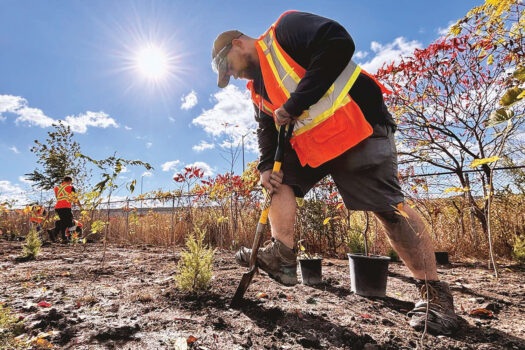By Allan Dennis
The owner of The Plant Lady is actually no lady at all, but is a highly motivated and successful LO member, Stephen Schell.
For 30 years, The Plant Lady in Kitchener has maintained the interior beauty of offices and homes. Having been involved in horticulture for 30 years, Stephen purchased the business in 1990. Since then it has grown to 18 employees, serving an area that stretches from Markham to Hamilton to Kitchener.
The business has grown so much over the past few years that Stephen has been unable to tend plants himself, as he once did daily. Now he must focus on administration duties. “We have seen 50 per cent growth since May 2007,” says Stephen. He estimates The Plant Lady cares for about 13,000 plants.
“Our indoor tropical plant installations feature only the finest plants from the world’s foremost growers. Combined with our unrivalled maintenance program, our plants will create a more pleasant and healthier environment for our customers,” says Stephen. He explains that his goal is to ensure that his customers never have a reason to call. “Our maintenance program ensures a regular schedule.” A customized care program is created to make sure plants are watered, pruned and cared for in order to maintain their health and appearance.
“Our clients pay us the ultimate compliment when they realize that they never think of their plants, but instead they only enjoy the benefits,” says Stephen.
“The core of our business is to make people happy,” he adds, explaining that when he hires people he places great importance on personality. “I want employees who are people-friendly. They must put positive customer relationships ahead of everything else. My staff members are The Plant Lady,” says Stephen.
In the interiorscape business, the goal is to humanize clients’ offices. A number of years ago, at least 40 per cent of clients wanted artificial plants. “That number is now zero,” says Stephen. “People now want real plants.” He explains that many companies now understand that by placing live plants in the work areas, it will improve the air.
“We guarantee that every plant we install will exceed expectations,” says Stephen. He works with customers before any plants are brought in to determine the type of plant that will be needed in regards to lighting and conditions. “Many times the plants become a popular feature in offices. Customers themselves take pride in the plants, and want to be involved in their care.” On average a plant will remain in an office setting five to six years, and as long as 15 years for some specialty plants. Stephen notes that sometimes, people don’t want the plant moved out. They see the plant as a living companion in their office environment.
Stephen first became involved with LO back in the l980s through his father’s company. That involvement became more hands-on in the past four years, when Stephen joined the Interiorscape Commodity Group, which he now chairs and serves as its board representative.
He recently returned from Atlanta, where he attended a summit for the interiorscape industry.
Stephen says he wants to see a connection made with some of the smaller interiorscape businesses, in order to convince them on the benefits of belonging to Landscape Ontario.
He is also a big believer in CHT-I training. “We run bi-weekly staff meetings where we always try to teach something new to our staff and I often include a general discussion about industry news. About two years ago we were keeping our staff up to date on the new CHT-Interior study program that was being developed and they started to ask for the opportunity to learn about the CHT-I program and study for the exams.
“Initially, we were skeptical about our staff’s commitment to completing the CHT-I training and felt that staff would soon lose interest. When they kept asking for the training, we hired Fred Prescod to provide a CHT study program for us. We all worked together, in a classroom setting, over several months and then wrote the CHT-I exam together as a group. Each one of us came away from the course with a better understanding of the plants that we all care for and are all better horticulturists for it.
“When the course was completed, I initially thought, ‘Wow, look at the money that I spent on staff wages, the trainer, study materials and on the exam fees. How will I ever get a return on that investment?’ Today, I am convinced that this has been a great investment. It returns dividends to us in high client retention rates, minimal supervision requirements for staff, low complaint rates from clients and when we do get a complaint, it is almost always a very minor problem, which is easily corrected. I think that the reason that we have seen these positive results is because this education has created greater staff commitment to their jobs, which has shown itself in the enthusiasm in their work. It shows in the analytical way that they approach plant problem diagnosis and the intelligent decisions that they chose, such as the plant choices that they make when they replace plants to avoid future plant replacements. It also shows in the nearly zero staff turnover that we are experiencing, and in extremely high satisfaction results that we are achieving in client surveys that we do.
“The training has one other unexpected side benefit that I have really noticed in the past six months in particular. I feel that our staff members are generally happier and more confident people than they were two years ago. This has meant that they are confident enough in themselves to solve problems without the need for support from a supervisor. It also means that internal conflicts are fewer, and are almost always solved by the participants themselves in an amicable way.”
Stephen says that in general, he has a more smoothly operating company that is easier for him to manage.
Caption: Stephen Schell is able to house hundreds of plants fresh from the nursery in his heated warehouse in Kitchener.








